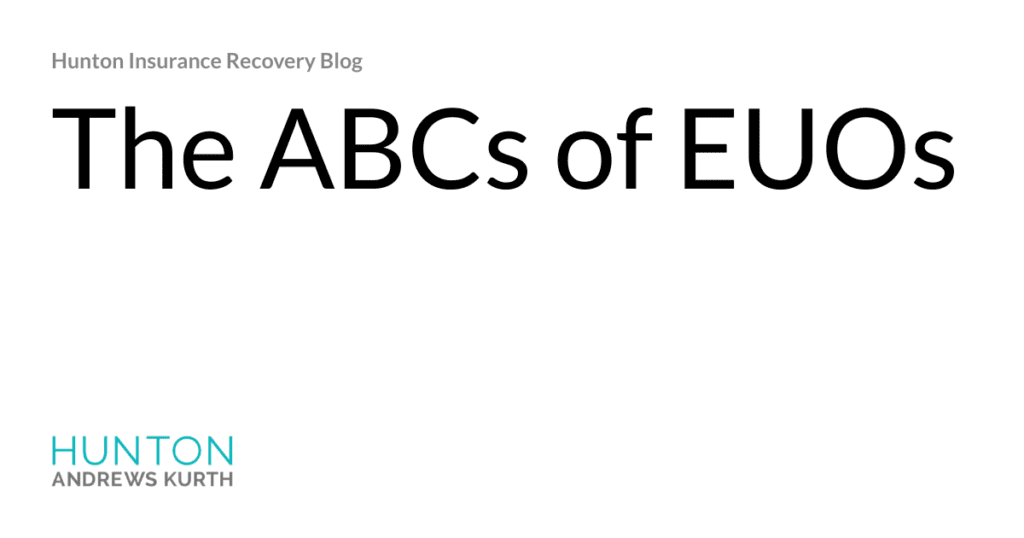The ABCs of EUOs

Insurers generally have a right to conduct a full, fair, and thorough investigation of a claim. Depending on policy language, one investigative tool available to insurers is the examination under oath, or an “EUO.” In an EUO, a representative of the policyholder is sworn-in, and an employee of or attorney for the insurer asks questions related to the claim. EUOs may be a condition precedent to coverage, meaning failure to appear and comply with a reasonable EUO request may void coverage for the claim. See, e.g., Quality Health Supply Corp. v. Nationwide Ins., No. 2021-06955, 2023 WL 3486573 (N.Y. App. Div. May 17, 2023); Raymond v. State Farm Fire & Cas. Co., 614 F. Supp. 3d 1303 (N.D. Ga. 2022).
The EUO Request
An EUO request is usually made in a written letter from the insurer or its attorney. The request will quote the relevant policy provision that gives the insurer the right to take an EUO. It may (but does not have to) identify topics the insurer wants to cover in the EUO. The request will specify the EUO’s time and place, but it should allow the policyholder a chance to suggest a different time if there is a scheduling conflict.
EUO requests may include a list of document and information requests, sometimes called “requests for information” or “RFIs.” Responsive documents may be produced before the EUO or the policyholder may bring the documents to the EUO.
EUO Procedures
EUOs usually take place at an office building or a law firm near the site claim’s location or otherwise convenient to the policyholder. A court reporter should be present for the entire proceeding. The court reporter will swear in the policyholder and record the exchange.
An EUO is considered sworn testimony. The policyholder must testify truthfully, although in some jurisdictions he or she may assert a constitutional right against self-incrimination (i.e., “plead the Fifth Amendment”). The policyholder representative should not speculate or testify about information he or she does not recall.
A policyholder is allowed to have an attorney represent them at the EUO.
When do insurers request an EUO?
Most claim’s investigations do not involve an EUO. Whether an insurer decides to take an EUO on the claim’s facts and issues. EUOs are often used at the end of a claim’s investigation process when the insurer has gathered conflicting or incomplete information during its investigation. So, if there have been any changes during the claim’s presentation, the policyholder should be prepared to explain them at the EUO. For instance, if there has been an increase in the cost or scope of repair after a loss, the policyholder should be prepared to testify about what caused the change.
Failure to Comply
Often, policies treat compliance with an EUO request as a condition precedent to coverage, meaning an insurer may deny coverage for the claim if the policyholder does not comply. See, e.g., Quality Health, 2023 WL 3486573 (N.Y. App. Div. May 17, 2023); Raymond, 614 F. Supp. 3d 1303 (N.D. Ga. 2022).
Adequacy of compliance exists on a spectrum from total failure to appear for the EUO, to failure to respond to relevant, material questions, to failure to respond to irrelevant, non-material questions. An insurer’s right or ability to deny a claim based on compliance with an EUO condition depends on the policy language and the law in the relevant jurisdiction.
Tips for Policyholders
EUO requests may appear to be informal invitations to chat with your insurer about your claim. Don’t be fooled. EUOs are recorded, sworn testimony, akin to a deposition or witness examination at trial. Failure to comply or inadequate compliance may result in loss of all coverage for the claim and even an insurer’s attempt to void the policy completely.
Policyholders should prepare for an EUO and associated RFIs with the seriousness EUOs and RFIs require. That preparation will generally be guided by in-house or outside counsel. Policyholders should also consider retaining effective, experienced counsel to represent them at the EUO, much like during a deposition.



